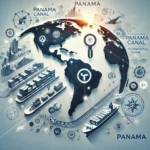Introduction:
The landscape of offshore jurisdictions in the Americas and the Caribbean is diverse and complex, offering a variety of options for asset structuring, tax planning and asset protection. This comparative atlas aims to provide a detailed overview of the main offshore jurisdictions in the region, highlighting their peculiarities, advantages and disadvantages.
According to recent IMF data, offshore financial centers in the Americas and the Caribbean manage assets in excess of US$4 trillion. This impressive volume underscores the importance of these jurisdictions in the global financial system and the need for an in-depth understanding of their unique characteristics.
In this comprehensive guide, we will explore the nuances of each jurisdiction, providing valuable insights for financial professionals, lawyers, entrepreneurs and high net worth individuals looking to navigate this complex offshore landscape. Get ready for a detailed journey through the main offshore jurisdictions in the Americas and the Caribbean.
Part 1: Ready to Roll 🚀 – Basic Strategies and Practical Actions
Part 1, “Ready to Roll”, offers practical actions and immediate advice for entrepreneurs who need quick and effective guidance.

Overview of Offshore Jurisdictions in the Americas and Caribbean
- Cayman Islands:
- Overview: One of the most established and respected offshore financial centers globally.
- Advantages:
- Legal system based on British common law
- No direct taxes
- Strong financial services sector
- Political and economic stability
- Disadvantages:
- High operating costs
- Increasing international scrutiny
- Peculiarities:
- Global leader in hedge fund registrations
- Sophisticated regulatory regime for investment structures
- British Virgin Islands (BVI):
- Overview: Popular for company incorporation and holding structures.
- Advantages:
- Fast and efficient incorporation process
- Flexibility in corporate structuring
- Significant corporate secrecy
- Disadvantages:
- Reputation affected by recent scandals
- Growing pressure for greater transparency
- Peculiarities:
- Innovative legislation for cryptocurrencies and fintech
- Internationally recognized ship registry
- Bahamas:
- Overview: Established financial center focusing on private banking and wealth management.
- Advantages:
- Proximity to the US
- Favorable legislation for trusts and foundations
- Developed banking sector
- Disadvantages:
- Vulnerability to natural disasters
- Reputational challenges related to money laundering
- Peculiarities:
- Pioneer in the regulation of digital assets
- Attractive investment residency regime
- Bermuda:
- Overview: Global leader in offshore insurance and reinsurance.Advantages:
- High quality regulation in the insurance sectorSophisticated business environmentPolitical and economic stability
- High cost of living and operating costsRestricted labor market
- Overview: Global leader in offshore insurance and reinsurance.Advantages:
- Panama:
- Overview: International business center with a diversified economy.
- Advantages:
- Robust banking system
- Colón Free Trade Zone
- Legislation favorable to offshore corporations
- Disadvantages:
- History of financial scandals (e.g. Panama Papers)
- Perception of weak regulation in some areas
- Peculiarities:
- Global logistics hub due to the Panama Canal
- Attractive territorial tax regime
- Barbados:
- Overview: Emerging as a center for international financial services.
- Advantages:
- Extensive network of double taxation treaties
- Stable regulatory environment
- Well-educated workforce
- Disadvantages:
- Relatively small economy
- Dependence on tourism and financial services
- Peculiarities:
- Growing focus on fintech and digital economy
- Attractive regime for international companies
- Curaçao:
- Overview: Offshore jurisdiction with close ties to the Netherlands and the European Union.
- Advantages:
- Access to the Dutch legal system
- Strategic location between the Americas and Europe
- Favorable tax regime for holding companies
- Disadvantages:
- Limited domestic market
- Dependence on a few economic sectors
- Peculiarities:
- Center for e-gaming and online gambling
- Special economic zone for innovation
Part 2: Deep Dive 🤿 – Technical Delving into Advanced Strategies
Part 2, “Deep Dive”, provides in-depth analysis for those wishing to delve into the technical and complex aspects of international finance.

- Comparative Corporate Structures: a) Limited Liability Companies (LLCs):
- Available in: Cayman Islands, BVI, Bermuda
- More flexible in the Cayman Islands in terms of governance
- BVI offers faster registration process
b) International Business Companies (IBCs):
- Popular in: BVI, Bahamas, Panama
- Bahamas offers greater secrecy
- Panama offers better integration with onshore operations
c) Foundations:
- Well established in: Panama, Bahamas
- Panama offers greater flexibility in structure
- Bahamas has more robust regulations
- Comparative Analysis of Tax Regimes: a) Zero Taxation:
- Cayman Islands, BVI: No direct taxes
- Advantage for pure investment structures
b) Low Taxation Regimes:
- Barbados: Corporate rate of 1-5.5%
- Attractive for companies with substantial operations
c) Territorial systems:
- Panama, Curaçao: Tax only local source income
- Beneficial for companies with global operations
- Regulation and Compliance: a) Anti-Money Laundering (AML) standards:
- Bermuda and Cayman Islands: Stricter standards
- Panama: Significant improvements following recent scandals
b) Automatic Exchange of Information:
- All the jurisdictions mentioned have joined the CRS (Common Reporting Standard)
- Cayman Islands and Bermuda: More robust implementation
c) Register of Beneficial Owners:
- BVI and Cayman Islands: non-public central registries
- Growing trend towards greater transparency in all jurisdictions
- Specialized Sectors and Market Niches: a) Investment Funds:
- Cayman Islands: Global leader, especially for hedge funds
- Bermuda: Strong in private equity and venture capital funds
b) Insurance and Reinsurance:
- Bermuda: Global dominance in catastrophe insurance
- Cayman Islands: Growing captive insurance market
c) Wealth Planning Structures:
- Bahamas: Specializes in trusts and family structures
- BVI: Popular for wealth holding companies
d) Fintech and Cryptocurrencies:
- Bermuda: Advanced legislation for blockchain companies
- Curaçao: Emerging in the e-gaming and cryptocurrency sector
- Infrastructure and Quality of Life: a) Connectivity:
- Panama: Global logistics hub with excellent air connectivity
- Cayman Islands: Frequent connections to the main financial centers
b) Technology and Telecommunications:
- Bermuda: World-class IT infrastructure
- Barbados: Significant investments in broadband and 5G
c) Quality of Life:
- Cayman Islands: High standard of living, but high cost
- Panama: Good value for money, especially for expats
- Future Trends and Challenges: a) Pressure for Transparency:
- All jurisdictions face increasing demands for greater openness
- Challenge of balancing attractiveness with international compliance
b) Economic Diversification:
- Bahamas and Barbados: Focus on technology and innovation to reduce dependence on tourism
- Curaçao: Development of creative and technological industries
c) Global competition:
- Growing competition from Asian and European financial centers
- Need for continuous innovation in financial products and services
d) Climate Change:
- Significant risk for island jurisdictions
- Development of financial products focused on climate resilience
- Practical Considerations for Choice of Jurisdiction: a) Purpose of Structure:
- Investment: Cayman Islands or Bermuda may be ideal
- Asset Holding: BVI or Bahamas offer good options
b) Risk Profile:
- Conservative: Bermuda or Cayman Islands, with more robust regulation
- Higher risk appetite: Emerging jurisdictions such as Curaçao or Barbados
c) Operating costs:
- Limited budget: BVI or Panama offer more economical options
- Willingness to Invest: Cayman Islands or Bermuda, with premium services
d) Networking needs:
- Focus on the USA: Bahamas or Cayman Islands due to proximity
- European connections: Curaçao, with its Dutch ties
e) Sector expertise:
- Insurance: Bermuda is the obvious choice
- Investment Funds: Cayman Islands leads the sector
Conclusion
The landscape of offshore jurisdictions in the Americas and the Caribbean is rich and diverse, offering a range of options to meet the most varied international financial and corporate structuring needs. Each jurisdiction presents its own unique set of advantages, challenges and specializations.
The Cayman Islands and Bermuda stand out for their regulatory sophistication and specialization in specific sectors, such as investment funds and insurance, respectively. The BVI remains a popular choice for fast and efficient incorporations, while Panama offers a versatile platform for international business with its diversified economy.
Jurisdictions such as the Bahamas and Barbados are evolving rapidly, focusing on innovation and technology to maintain their competitiveness. Curaçao, meanwhile, presents interesting opportunities in niches such as e-gaming and the digital economy.
As the global regulatory landscape continues to evolve towards greater transparency and economic substance, these jurisdictions are adapting, seeking to balance their traditional attractiveness with compliance with international standards. This balance will be crucial to their continued relevance and success on the global financial stage.
The choice of the ideal jurisdiction will depend on a careful analysis of the specific objectives, operational needs, tax considerations and risk profile of each client or project. It is essential to carry out comprehensive due diligence and seek expert professional advice when navigating this complex offshore landscape.
For continued insight into this dynamic topic, we recommend attending our upcoming virtual symposium: “Navigating the Future of Offshore Financial Centers in the Americas”. This event will bring together experts from each jurisdiction, regulators and industry professionals to discuss the latest trends, challenges and opportunities in this ever-evolving landscape.
FAQs
- Q: How have recent global tax transparency initiatives affected these offshore jurisdictions? A: All the jurisdictions mentioned have implemented compliance measures with international standards, such as CRS and FATCA. This has resulted in greater transparency and exchange of information, but also higher compliance costs for companies and individuals using these structures.
- Q: Which jurisdiction offers the best asset protection? A: While all offer some level of protection, the Cayman Islands and Nevis (not detailed in this guide, but part of the Caribbean) are often cited as having particularly strong asset protection legislation. However, effectiveness depends on the proper structuring and timing of the asset transfer.
- Q: How can I assess the political and economic stability of an offshore jurisdiction? A: Consider factors such as recent political history, economic diversity, international relations and rating agency assessments. Jurisdictions such as the Cayman Islands and Bermuda tend to be seen as more stable due to their long history as financial centers and strong ties to the UK.
- Q: What are the emerging trends in offshore financial products in these jurisdictions? A: There is a growing focus on ESG (Environmental, Social, and Governance) related products, fintech, and cryptocurrency investment solutions. Bermuda and the Bahamas, for example, have been pioneers in regulating digital assets and blockchain.
- Q: How is climate change impacting the choice of offshore jurisdictions in the Caribbean? A: The risk of natural disasters is becoming an increasingly important consideration. Jurisdictions such as Bermuda and the Cayman Islands have invested significantly in resilient infrastructure and developed specific financial products to mitigate climate risks. This has become a differentiating factor when choosing jurisdictions, especially for long-term structures.
Additional Analysis and Future Considerations:
- Evolution of the Regulatory Scenario: a) Pressure for Economic Substance:
- Implementation of economic substance requirements in all jurisdictions
- Cayman Islands and Bermuda leading the way in terms of regulatory stringency
- Impact on company structuring and the need for physical presence
b) Public registers of beneficial owners:
- Growing trend towards greater transparency
- BVI and Cayman Islands moving towards public registers
- Challenge of balancing privacy with demands for transparency
c) Harmonization of Standards:
- Movement towards more uniform regulation across jurisdictions
- Growing influence of international bodies such as the OECD and FATF
- Innovations in Financial Services: a) Regulatory Sandboxes:
- Bermuda and Bahamas implementing testing environments for fintech
- Opportunities for startups to test innovative products in controlled environments
b) Asset tokenization:
- Curaçao and Bahamas exploring regulations for tokenization of real assets
- Potential to revolutionize the liquidity of traditionally illiquid assets
c) Green Financial Services:
- Barbados and Panama developing financial products focused on sustainability
- Growth of ESG funds and green bonds
- Geopolitical and economic challenges: a) Impact of Brexit:
- Potential reconfiguration of relations between British overseas territories and the EU
- Opportunities for non-British jurisdictions such as Curaçao and Barbados
b) US-China tensions:
- Caribbean jurisdictions positioning themselves as neutral bridges for investment
- Panama potentially benefiting as an alternative logistics hub
c) Post-pandemic recovery:
- Economic diversification as a priority in all jurisdictions
- Focus on attracting digital nomads and tech companies
- Cost and Efficiency Comparison: a) Incorporation costs:
- BVI remaining the most economical option for simple incorporations
- Cayman Islands with higher costs, but offering more sophisticated structures
b) Annual Operating Costs:
- Significant variation: from US$1,000-2,000 in the BVI to US$5,000-10,000 in the Cayman Islands
- Cost-benefit considerations in relation to reputation and regulatory robustness
c) Administrative efficiency:
- Bahamas and Barbados investing in digitization of government processes
- Panama improving efficiency, but still facing bureaucratic challenges
- Trends in Trust Structures: a) Purpose Trusts:
- Growing popularity in the Cayman Islands and Bermuda
- Used for specific objectives, such as philanthropy or maintenance of family assets
b) STAR Trusts (Reserved Powers):
- Cayman and BVI offering flexibility for settlors to retain certain powers
- Delicate balance between control and effectiveness of trust structure
c) Private Foundations:
- Panama leading the way in flexibility and use of foundations
- Bahamas introducing competitive legislation for foundations
- Developments in Dispute Resolution: a) International Arbitration:
- Cayman Islands establishing itself as an arbitration center for financial disputes
- BVI investing in commercial dispute resolution infrastructure
b) Specialized Commercial Courts:
- Bermuda with highly respected commercial court
- Jamaica (not detailed above) developing expertise in regional financial disputes
c) Online Mediation:
- Growing adoption of online mediation platforms across jurisdictions
Barbados leading the way in digital dispute resolution regulation
Final thoughts:
The landscape of offshore jurisdictions in the Americas and the Caribbean is constantly evolving, responding to global regulatory pressures, technological innovations and changing client needs. The key to the future success of these jurisdictions will be their ability to adapt quickly, maintaining a balance between business attractiveness, regulatory compliance and international reputation.
There is a clear tendency for the more established jurisdictions, such as the Cayman Islands and Bermuda, to move towards niches with greater added value and regulatory sophistication. At the same time, emerging jurisdictions such as Barbados and Curaçao are seeking to differentiate themselves through innovation and specialization in specific sectors.
For professionals and clients using these jurisdictions, continuous due diligence and adaptability will be crucial. Choosing the ideal jurisdiction will increasingly depend on a holistic analysis that considers not only tax and legal aspects, but also reputational, operational and long-term ones.
As the world moves towards greater transparency and economic substance, we are likely to see consolidation in the sector, with jurisdictions that manage to adapt effectively emerging as leaders in their respective niches.
Ultimately, the future of offshore jurisdictions in the Americas and the Caribbean will be shaped by their ability to offer real value beyond simple tax optimization, focusing on operational efficiency, sector expertise and a regulatory environment that inspires confidence for both clients and the international community.

Member of the IMA (Institute of Management Accountants) – USA
Member of the AICPA (American Institute of CPAs) – USA
Member of AAII (American Association of Individual Investors) – USA
Member of AAA (American Accounting Association) – USA
Member of the FMA (Financial Management Association) – USA
These associations not only attest to Kleyton’s commitment to professional excellence, but also ensure that his knowledge is always at the forefront of international financial and accounting practices.
With a robust academic background, including a Bachelor’s degree in Accounting and MBAs in International Finance and Accounting, as well as in International Business, Kleyton offers a unique and comprehensive perspective on the global business landscape.
Through the Tartarotti Report, Kleyton invites visionary entrepreneurs and executives to connect, explore opportunities for collaboration and, together, successfully navigate the complex world of international corporate finance.







